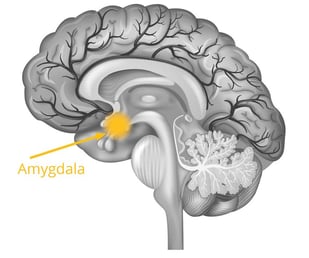Coronavirus Shopping: Why Your Brain Makes You Hoard and How to Fix it
Dec 02, 2024
Written by: Dr. Mike Ronsisvalle
Just a few weeks ago as many of us were doing life as usual, it seemed as if the stability of our world was fairly certain.
The economy was roaring. The stock market was strong. Everything seemed steady. Unremarkable. Predictable.
Then, a new strain of coronavirus called COVID-19 changed everything.
In a matter of one week, we saw sporting events canceled, festivals and social gatherings postponed, and even the education of our children grind to a halt.
In an effort to “flatten the curve” governmental leaders have systematically shut down businesses and encouraged social distancing and self-quarantine.
Our comfortable, predictable lives have become downright strange and all this uncertainty is taking a psychological and emotional toll on us.
To use a non-clinical term, many of us are just plain freaking out.
Some of us have even started to panic, which only breeds more emotional reactivity in others.
While COVID-19 clearly has the potential to be devastating to us, both physically and economically, my concern is that it might be having its most stealth-like effect upon our emotional lives.
There’s a neurological and psychological reason our current situation is creating such emotional turmoil.
Let me give you an example from my own life that perfectly illustrates this phenomenon.
As I walked down the aisles of a Publix recently, the disorientation of this new coronavirus experience was very real.
For the first time in my life, I couldn’t find things like toilet paper or bleach or my favorite cut of meat.
It was almost confusing as I looked at images that I had never seen before: empty shelves.
To say I felt a tinge of anxiety might be accurate, but it was more than that. The best way I can describe it would be to say it was a novel situation.
It felt like new and uncharted territory. Certainly, we are all having experiences like this.
Public places look less crowded. Office buildings and restaurants are empty. Children are home when they should be in school.
Combine these new realities with the fact that our attention is being focused on the threatening aspects of the situations by an unlimited supply of both accurate and inaccurate information about the virus and you have a nation of people that is laser focused on a potential threat to our most basic survival instinct.
Our brains are hardwired to respond to threat and uncertainty by shutting down the logical prefrontal cortex and activating the amygdala, which is the fear-threat mode of the brain.
When the amygdala is activated, we are in survival mode and will do almost anything to control the situation and feel safe.
Many times we make poor decisions when the amygdala has hijacked our brain because we are impulsively acting out of fear rather than intentionally weighing the facts and making rational choices.
Logically, we know we don’t need a six-month supply of toilet paper, but emotionally we end up buying every roll of toilet paper we can get our hands on.
In the face of this incredibly new coronavirus-driven world we are living in, a desire for control and certainty are at the core of our amygdala driven fear and panic.
If we want to navigate the ever-changing unpredictable circumstances we are facing everyday, we need to make the decision together that we will actively pursue the following healthy strategies.
1. Calm down the amygdala
If we are being chased by a wild animal, we want the amygdala activated.
We don’t have time to think, so we need to make quick decisions that are intuitive, reactive and geared toward self-preservation.
To make decisions about you and your family in the age of COVID-19, you need a calm reasoned approach.
Translation: You have to turn your amygdala off and turn your prefrontal cortex back on.
There are many ways to do this, but at the most basic level it involves breathing deeply and relaxing your body.
There’s even a link on my website (drmikeronsisvalle.com) to a set of audio files that will talk you through how to progressively relax every muscle group in your body.
If you are a person of faith, calm contemplative prayer has been proven to be incredibly effective to bring peace physiologically and to help you exit the fear-threat mode in the brain.
Start by setting a goal for yourself to practice some sort of calming activity at least twice a day.
2. Fix your brain’s desire to control the uncontrollable.
Once your amygdala is turned off, you are in a position to begin to battle the fear thoughts that want you to control and create certainty.
The truth is, we are all in a spot where we are facing new and unpredictable situations everyday.
Your brain wants to convince you that the best response is to try to control things that are in reality uncontrollable.
Combat this innate tendency by being honest with yourself.
Challenge the idea that reactive irrational thoughts and behaviors like buying boxes of hand sanitizer actually keeps you safe and focus on what you can do going forward that will actually increase your odds of being safe.
For instance, instead of obsessing about who you might have come in contact with that could have been infected, take a deep breath and focus on the hand washing hygiene you have practiced for days.
Just by taking a moment to pause and evaluate what we have control over and what we don’t will give our prefrontal cortex a chance to come back online and do what it does best: Think.
“I can’t do anything about who I came in contact with last week or who I might have to talk to tomorrow, but I can wash my hands often.”
3. Choose hope.
The prefrontal cortex is responsible not only for executive functioning like rational thought and decision making, but also for complex emotional experiences like hope and faith and optimism.
When the amygdala is activated, it’s easy to get stuck in hopeless global thoughts that tell us our lives will never be the same and that we are destined to see our world forever marred and broken.
This is the actual title of an article on a popular website I found a couple days ago: “The coronavirus crisis will pass, but life may never be normal again.”
While some of the content in the article was actually helpful, the headline perfectly captures the hopelessness of the amygdala-driven response that many people are currently struggling with.
We can combat this hopeless frame by using a tactic psychologists call “temporal distancing,” which essentially means focusing your attention on a longer timescale.
One temporal distancing strategy we can all try is to imagine how life might look in a year or even a few years from now.
Once this is all over and the virus has been contained for one year or five years, can you envision a positive future?
This kind of perspective-broadening tool can effectively relieve negative fear-based emotions.
If you want ammunition for this kind of strategy, put COVID-19 in historical context.
We have dealt with viral outbreaks as a society before, and we have not only gotten through them, we have thrived.
As a community, we must choose hope together.
It’s imperative that we remember the resilience of the human spirit and trust that we will come out on the other side of this crisis with the ability to live healthy, happy, meaningful lives.
Dr. Mike Ronsisvalle is a Licensed Psychologist and the President of Florida Counseling Centers, a psychological services agency that provides counseling to clients of all ages and addictions treatment to adolescents and adults. You can find him on the web at Floridacounselingcenters.com; https://www.facebook.com/LessStressedLife; https://twitter.com/MikeRonsisvalle. Or call 321-259-1662.



